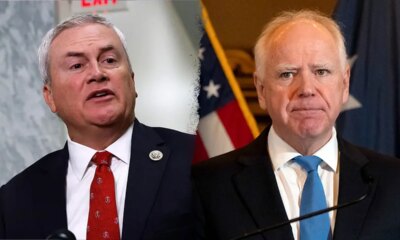Mississippi
MS House passes income tax cut after nearly 2-hour debate. Will Senate pass it next?

Democrats concerned about impact of raising taxes on local populations
Mississippi House passes bill to cut income and sales tax
Rep. Trey Lamar, R-Senatobia, House Ways and Means chairman, presents the Build Up Mississippi Act to cut income and sales taxes.
The Mississippi House of Representatives passed a $1.1 billion tax cut bill on Thursday after nearly two hours of debate, sending it on to the Senate where leadership is considering a starkly different approach, and thus is unlikely to pass the House version.
House leadership after the vote said there really isn’t much room for compromise, but there is hope that because Senate leadership wants to cut taxes, both sides can hopefully come to an agreement.
“I’m encouraged by the fact that that (Lt. Gov. Delbert Hosemann) is talking about cutting taxes, I think that’s a good place to start, as opposed to somebody who wouldn’t,” House Speaker Jason White,R-West, said. “Now maybe we’ll figure out the best way to get there in this process.”
House Bill No. 1, dubbed the Build Up Mississippi Act, passed with 88 votes. Of them, at least nine were Democrats and two were independents. There were 24 no votes, consisting only of Democrats.
“It’s bipartisan to some extent. And you saw a lot of people, maybe they didn’t vote yes, they didn’t vote no, either,” White told reporters after the vote. “I’m proud of my Republicans for speaking as one, as a caucus, that this is important to them and to their constituency. It’s a good, strong vote for us, and it’ll be a strong position for me as speaker to advocate for its passage and advancement on the other end of the building.”
If passes both chambers as is, the bill would:
- Eliminate $2.2 billion in income tax revenues over 10 years. The cut would become active once the state’s income tax is phased down to 4% by Fiscal Year 2027.
- Reduce state sales tax on groceries from 7% to 2.5% while adjusting tax structure on other items to offset the costs.
- Removes state sales tax diversions to municipalities and replaces it with a local-option 1.5% local sales tax. Cities will have the option to opt-out of this tax structure. Lamar said this will result in local tax revenue increases across the state.
- Sales tax collected at 1.5% in counties will be diverted to road and bridge infrastructure needs at the county level.
- Add a fuel sales tax of 5% on retail sale of gasoline. This would be in addition to the state fuel tax already imposed. Lamar said this would add $400 million to the state budget, and all of those additional funds would go to the Mississippi Department of Transportation for road and bridge projects.
- The $80 million that was going to MDOT per year from gambling revenue will now be headed toward the Public Employee Retirement Systems of Mississippi to address a $25 billion deficit in future retirement benefits.
- Establishes a “budget stabilization fund” that will act as a secondary rainy-day fund.
“This is all about 10 years later, we’re finally at a place where we can tell the hard-working people of Mississippi that we are going to eliminate the tax on work for you, your children, your grandchildren and all future generations,” House Ways and Means Chairman and bill sponsor Trey Lamar, R-Senatobia, said.
The bill, however, will not include an income tax cut for sex workers in Mississippi, who will be taxed at 5% of their income once the tax cut is fully phased in.
Before voting on the bill, several Democrats questioned whether the tax package would actually end up costing the state more money down the road and causing revenue shortfalls. They also questioned whether moving to a consumption-based economy would result in poorer people paying more money out of pockets because of increases in costs due to the new gas tax and sales tax model.
Others pointed out growing needs to repair and replace existing government structures such as schools and offices.
“Has any thought been given, or was any thought given about not only for schools, but the age of infrastructure of all of the state buildings across the state?” asked Rep. Bryant Clark, D-Lexington.
Rep. Omeria Scott, D-Laurel, offered an amendment to just cut the sales tax immediately, calling on Republicans to not wait for the end of the 10-year phase-in of the tax cuts as proposed in the bill, but it was defeated.
After 2016 when the state passed several tax cuts, revenue shortfalls ensued, causing former Gov. Phil Bryant to make emergency budget cuts several times. Numerous county Mississippi State Department of Health County offices closed and state grant matches for federally funded infrastructure projects were put at risk.
Under the House plan, sales taxes excluding groceries would essentially amount to 8.5%, which still puts Mississippi at a lower sales tax than its neighbors.
House Speaker Jason White told reporters after the vote that he is optimistic about working with the Senate leadership, but he said he does not intend to compromise on fully eliminating the income tax or establishing infrastructure revenue streams.
Grant McLaughlin covers state government for the Clarion Ledger. He can be reached at gmclaughlin@gannett.com or 972-571-2335.

Mississippi
Gas prices on Mississippi Gulf Coast jump nearly 60 cents in one day

BILOXI, Miss. (WLOX) — Gas prices along the Mississippi Gulf Coast have jumped to nearly $3 a gallon, up from $2.41 just two days ago, according to AAA.
AAA said the increase is driven by two factors: the U.S.-Iran conflict, which has shut down a key Middle East oil route and prompted attacks on refineries, and a seasonal fuel blend switch that adds up to 15 cents a gallon on its own.
Uber Eats driver James Adams said he noticed the increase immediately.
“It actually jumped like 50 to 60 cents in one day,” Adams said.
Adams said the higher cost to fill his tank cuts directly into his delivery earnings.
“We’re working basically for pennies on the dollar already — and once you factor that in with traffic and the mileage you have to go — the gas is outrageous,” Adams said.
DoorDash driver Daniel Yelle said the spike will strain his weekly budget.
“I fill up about twice a week going to and from work and DoorDash — and that’s going to hurt my budget,” Yelle said.
FedEx driver Cecil Banks said there is little that workers can do about the rise in prices.
“As long as there is wars — the price of gas is going to go up for everybody — so it’s just an unfortunate situation,” Banks said.
Banks noted that even though Mississippi’s prices remain below the national average, not driving is not an option for working families.
“What can you do? A lot of people have families — they have to go get their kids — they have to go back and forth to work,” Banks said.
Yelle echoed that sentiment.
“They don’t pay us enough for the higher gas prices,” Yelle said.
See a spelling or grammar error in this story? Report it to our team HERE.
Copyright 2026 WLOX. All rights reserved.
Mississippi
It’s 2,350 miles long, spans 31 US states and is home to a 100kg animal with a tongue that looks like a worm | Discover Wildlife

The Mississippi River flows for around 2,350 miles through the heart of the US. It drains an area of 1.2 million square miles – that’s roughly 40% of the country – and at certain points is 11 miles wide. It is North America’s second longest river, behind the Missouri River.
Rising from Lake Itasca in Minnesota, the Mississippi winds southwards through a range of environments, draining water from 31 US states before reaching its delta at the Gulf of Mexico in Louisiana.
The sheer size of the river and the diversity of habitats it passes through make it a refuge for a huge range of animal species, including more than 260 fish, 326 birds, 50 mammals and at least 145 amphibians and reptiles, according to the National Park Service.
There are many weird and wonderful animals living within the Mississippi’s vast waters, but surely one of the strangest is the alligator snapping turtle.
This prehistoric-looking reptile is massive. It can weigh up to 100kg and males can grow well over half a metre long, making it the largest freshwater turtle in North America.
And as if its size wasn’t enough, the alligator snapper has a host of other characteristics that make it one of the Mississippi’s most striking creatures, including a dark, spiky shell (known as carapace), a brick-like head and a sharp, hooked beak. With such a formidable appearance, it’s easy to see how the turtle got its ‘alligator’ name.
But perhaps the turtle’s most curious feature is a worm-like appendage found on its tongue, which it uses as a lure to catch prey, such as fish, amphibians and invertebrates. Alligator snappers are also quite happy scavenging for food.
More amazing wildlife stories from around the world
Mississippi
Mississippi House of Representatives passes bill to make NIL earnings non-taxable

NIL money comes with a price. More specifically, a tax bill.
The Mississippi legislature is trying to reduce that burden for college athletes who play there.
Via Bea Anhuci of the Mississippi Clarion Ledger, the Mississippi House of Representatives has passed a bill that would exempt NIL earnings from state income tax.
It’s a recruiting tool for Ole Miss and Mississippi State, one that would put the Mississippi schools on equal footing with other states that host SEC universities. Florida, Tennessee, and Texas have no state income tax, and Arkansas carved out NIL earnings from the state’s income tax burden in 2025.
Mississippi currently charges a four-percent tax on anyone making more than $10,000 per year.
NIL earnings remain subject to federal income tax.
The bill will have to also pass the Mississippi Senate, and the governor would then be required to sign it into law.
-

 World1 week ago
World1 week agoExclusive: DeepSeek withholds latest AI model from US chipmakers including Nvidia, sources say
-

 Massachusetts1 week ago
Massachusetts1 week agoMother and daughter injured in Taunton house explosion
-

 Wisconsin4 days ago
Wisconsin4 days agoSetting sail on iceboats across a frozen lake in Wisconsin
-

 Maryland4 days ago
Maryland4 days agoAM showers Sunday in Maryland
-

 Florida4 days ago
Florida4 days agoFlorida man rescued after being stuck in shoulder-deep mud for days
-

 Denver, CO1 week ago
Denver, CO1 week ago10 acres charred, 5 injured in Thornton grass fire, evacuation orders lifted
-

 Massachusetts2 days ago
Massachusetts2 days agoMassachusetts man awaits word from family in Iran after attacks
-

 Oregon6 days ago
Oregon6 days ago2026 OSAA Oregon Wrestling State Championship Results And Brackets – FloWrestling





















